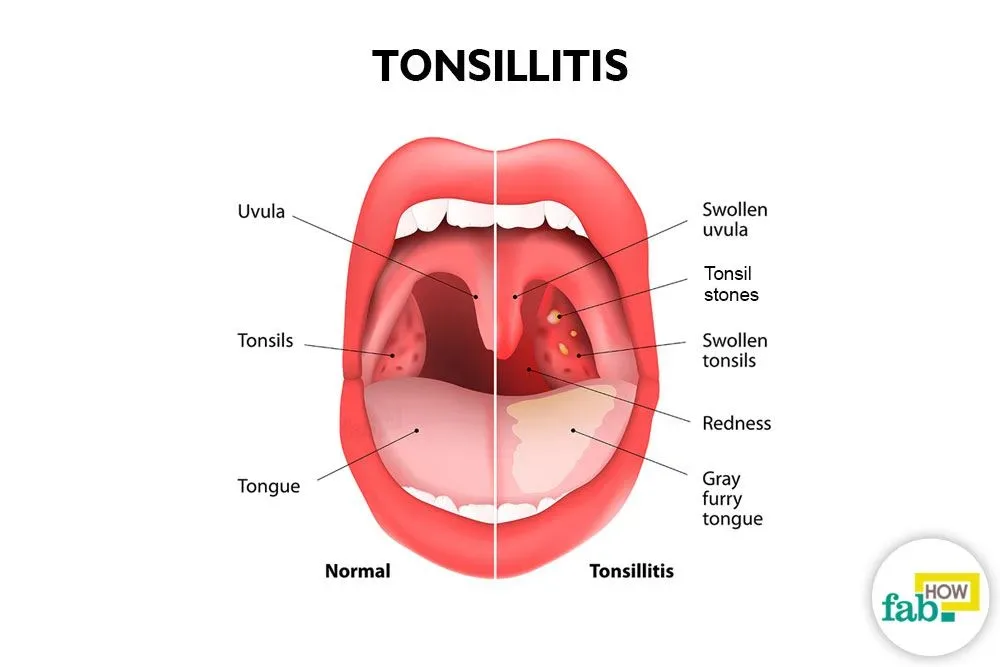Stick out your tongue and say “ahh!”. One reason your healthcare provider does this is to look at your tonsils in the back of your throat. Your tonsils are part of your immune system. They can also become inflamed or infected, a condition called tonsillitis.
What is tonsillitis?
Tonsillitis is inflammation of your tonsils, pieces of immune system tissue behind your nose and mouth. You have three types of tonsils: your adenoid tonsils behind your nasal cavity, your palatine tonsils at the back of your throat, and your lingual tonsil under your tongue.

Your tonsils play an important role in your immune function. They trap pathogens that enter your mouth and nose. After the bacteria and viruses are trapped, antibodies identify and attack them. By catching these pathogens early, your tonsils prevent infection.
Tonsillitis occurs when your tonsils, usually your palatines, become infected and inflamed. You may experience swollen tonsils, difficulty swallowing, and a sore throat.

What are some causes of tonsillitis?
Tonsillitis is caused by an infection, either from viruses or bacteria. Streptococcus pyogenes, which also causes strep throat, is the most common cause of bacterial tonsillitis. Children are at increased risk for tonsillitis due to their age and frequent exposure to bacteria and viruses.

What are signs and symptoms of tonsillitis?
The following are common signs and symptoms of tonsillitis:
- Swollen and/or red tonsils
- Problems swallowing
- Sore throat
- Bad breath
- Fever
- Swollen lymph nodes
- Difference in speech (a muffled or hoarse voice)
- Ear pain
- Headache
- Fatigue
- White or yellow spots on the back of your throat
- Tonsil stones, or tonsiliths, are pieces of calcified throat and bacterial cells that develop with inflammation of the tonsils. They form in your tonsillar crypts, little pockets located on your tonsils. Tonsil stones may lead to bad breath, coughing, sore throat, or a bad taste in your mouth. See below for a picture of a tonsil stone.

Signs and symptoms of tonsillitis usually resolve between three and four days.

When should I call a doctor?
It’s important that you see your healthcare provider or call one of our MedinAction doctors if you experience the signs and symptoms listed above. Complications from tonsillitis include difficulty breathing because swollen tonsils can block your airway. The infection can also spread to surrounding tissue (tonsillar cellulitis) or cause pus to accumulate behind your tonsils (peritonsillar abscesses).
If you have difficulty talking, swallowing, breathing, or opening your mouth, get medical attention right away.
What are some treatments for tonsillitis?
Whether the cause of your tonsillitis is bacterial or viral, you can take steps at home to reduce your signs and symptoms as well as promote healing. These include:
- Getting enough sleep
- Staying hydrated
- Easing throat pain with warm or cool liquids and foods, including:
- Broth
- Warm tea or water with honey
- Ice pops
- Gargling with salt water
- Add 1 tsp of salt to 8 oz of warm water, gargle, and spit the solution out
- Taking a hot shower or using a humidifier
- Using throat lozenges or sprays to soothe your sore throat
- Taking over the counter pain and fever medications such as ibuprofen (Advil) or acetaminophen (Tylenol). Consult your healthcare provider to ensure you are taking the right medication at the correct dosage

For treatment of tonsil stones, make sure you have good oral hygiene. Brush your teeth, floss, and gargle with salt water. If you would like to detach the stones from your tonsils, gently swab the stone with a cotton swab. Be very careful. Use a mirror and a flashlight to get the best view of your tonsils.
Your provider may prescribe antibiotics if your tonsillitis is caused by a bacterial infection. Penicillin is a common antibiotic used to treat streptococcus infections. Remember to take your antibiotics as prescribed, finish your prescription, and never take antibiotics prescribed for someone else.

A tonsillectomy is a surgery to remove your tonsils. This option is usually reserved for recurring tonsillitis, chronic tonsillitis, or bacterial tonsillitis that isn’t cured by antibiotics. Having more than 7 cases of tonsillitis in one year, 4 to 5 cases each year for the past two years, or 3 each year for the past three years are all definitions of frequent tonsillitis. Your provider may also recommend surgery if you have severe complications. These include obstructive sleep apnea, difficulty breathing and/or swallowing, or abscesses.
How can I prevent tonsillitis?
The best way to prevent tonsillitis is proper hygiene. This includes washing your hands correctly and not sharing food, utensils, or drinking cups. Also, you can prevent future infection by using a new toothbrush if you’ve been diagnosed with tonsillitis.
[su_divider top=”no” divider_color=”#f97575″ size=”1″]Ask for an advice from an expert. Insert your data, you will be contacted shortly!
[wpforms id=”14577″ title=”false” description=”false”]



